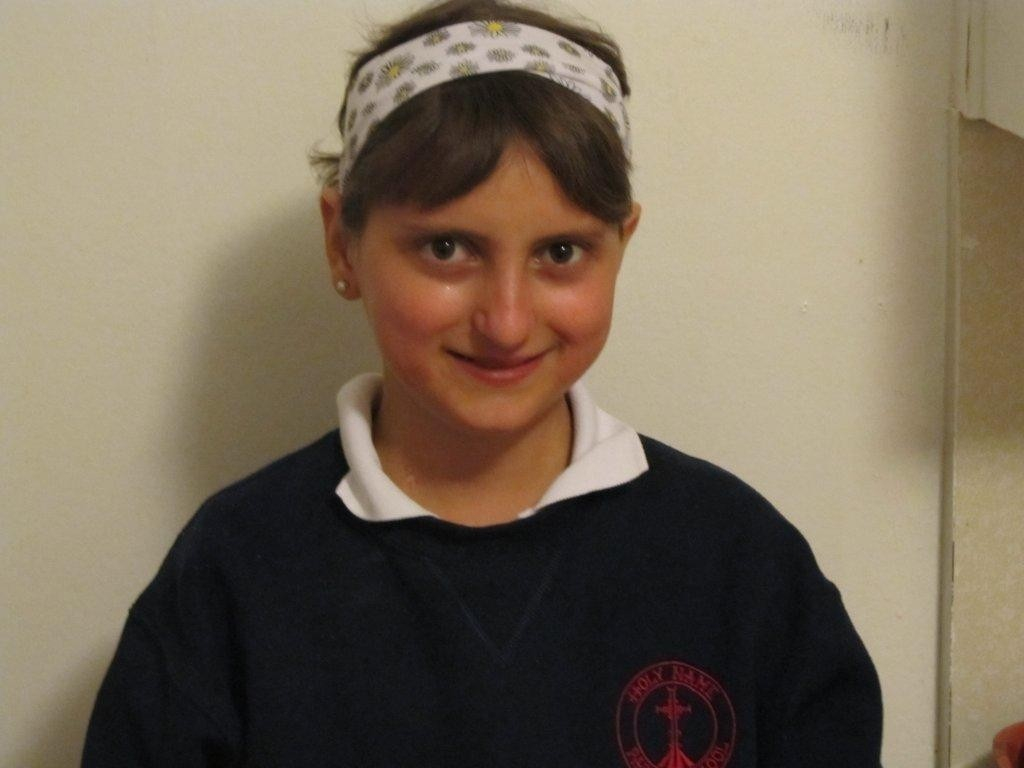"Back-to-School Specials!!!" scream the store placards. They are a reminder that now might be the time to get a discounted backpack for my younger daughter, but more potently, they nudge me back to my default: The bereaved mom aching for the child who will always be dead.
My elder daughter had loved school and if we had dodged that brain tumor bullet, she would now be eager for eighth grade. At her school, students aren't allowed to use the "h" word, but I think I am: I hate school. Not because of the curriculum, the students or the teachers, but because of the cataclysm of painful memories they unleash.
In the run-up to third grade, Natasha was excited to go back to school. Her scan was clear after surgeries and radiation, but our oncologist had presented us with the option of undergoing a few cycles of chemotherapy in an attempt to stomp out any rogue cancer cells that would be too small to be detected via imaging. The chemo would be harsh, she told us. Natasha might become very sick. It may or may not provide a modest degree of protection from recurrence.
We knew that a recurrence of her tumor would mean that Natasha's chance of reaching adulthood was slim. With much trepidation, we decided to go ahead with it. We realized that we could do "very sick"; it was "dead" that we could never do. That first cycle of chemo was scheduled so that she would hopefully recover in time for school.
On the first day of school, Natasha was fever-free -- her passport to join her classmates, as per her doctor's instructions -- but she was thin, barely eating and pallid. We would join class at lunchtime and I would wait in the parking lot in case there was a call to take her home. I stood with her in line as her classmates filed to class.
"Could you please keep an eye open for her?" I asked her teacher. There was a steely pause, followed by a reminder that there were 22 students in her class.
While Natasha's class was preparing to leave at the end of the school day, I was waiting outside her classroom. I caught sight of her teacher first: Had Natasha been OK? She brushed me off, evading eye contact with an "I think so," as I scanned the melee for my child. There she was!
"Natasha, how are you?" She lurched toward me and we made our way outside, where she vomited on the sidewalk. That evening she was admitted to the hospital, where she remained for more than two weeks.
Later that school year, Natasha rebounded. Her vivacity returned; her social life was littered with pool parties, trips to county fairs, sleepovers and shopping trips. She discovered hip-hop and developed a flair for loose-limbed dance moves. Natasha re-embraced school so I did, too. Well, sort of. By then, I was no longer the same as the other parents. I was the mom of that poor girl with the brain tumor.
When parents talked about exorbitant orthodontistry or head lice prevention, I would chime in. I would even listen attentively to impassioned speeches about the impact of the education cuts. But my heart had checked out ever since Natasha's diagnosis. Instead of thinking of the children who might be denied field trips or laptops or P.E. classes, I thought of Natasha's brothers and sisters-in-arms who would be denied a shot at reaching even their next birthday because their brain tumors were inoperable or they had metastasized to the extent that the effects of any treatment would be negligible. I thought of those children who had died from brain tumors in the first two years since Natasha's diagnosis. There was Sebastian, Laney, Joshua, Emma, Erin, Georgia, Matt, Madison, Ravyn, Katie, Luke, Karsyn, Alexander, Johnny ...
In fifth grade, Natasha's tumor recurred. She was rarely in class and we barely made it for school graduation. While other parents shed a tear because they knew their role would be redefined as their children started the metamorphosis to adulthood, I had to choke back sobs because I knew that it was unlikely Natasha would reach an age when she would graduate from another school.
In sixth grade, at Natasha's urging, we left public education for a neighborhood Catholic school.
"You'll have to wear a uniform," I said to the daughter who used to go to school with green nail polish, spray-colored hair and a ruffled miniskirt over flared pants.
"I like uniforms," she retorted.
"And it'll be strict! And you'll have to go to church!"
"I like church."
Catholic school, and in particular the school that she chose, suited my delicate daughter. The rules made her feel safe. Church services comforted her.
"We really love Natasha," one of her teachers told me with tears in her eyes. I believed her.
When Natasha confided in me that she wasn't strong enough to participate in recess, her art teacher welcomed her warmly into her classroom, where they talked about cats and sharpened pencils. When Natasha was sick, the school prayed for her. When Natasha was in the hospital, her teachers brought her home-baked cookies. When Natasha passed away, the school church offered to hold services for our non-Catholic family.
I love that school, but I can't bear it, too, because the daughter who should be looking forward to her final year before high school is no more. Natasha was proud to wear her school uniform: a white polo shirt, blue sweatshirt (collar tucked out) and blue and red plaid skort. Later in the month I'll start seeing girls of Natasha's age wearing that uniform again. And I'll have to look away.

This post originally appeared on The Mourning After Natasha.